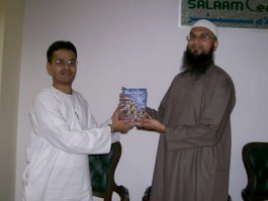Vaishnavas and Muslims Get to the Bottom of Things
By Rakesh Joshi | May 29, 2010

On May 2, devotees from ISKCON Bengaluru engaged in an interfaith dialogue with followers of Dr. Zakir Naik at the Salaam Center, a center for Islamic Studies in Jayanagar, Bangalore.
Vijay Venugopal represented the temple’s www.absolutetruth.in educational initiative at the event. He recalled his stay in Oman where he had such discussions with his Islamic colleagues. He put forward a strong case for mutual friendly co-existence based on tolerance and mutual respect and said that we need to learn to tolerate differences to live harmoniously.
He pointed out that there are various similarities that exist in the both religions: there is one God whom we need to serve and there are regulative principles like no intoxication, no illicit sex, and no gambling to follow. Meat eating is also regulated in both religions. In Hinduism, one can offer a goat in sacrifice if he wishes to eat meat. In Islam, there is the concept of halal.
Of course, there are various differences as well, Venugopal pointed out. The major differences that exist are in relation to reincarnation and cow killing. But, the differences between religionists and atheists are larger than the differences amongst religionists.
Mr. Omer Sheriff responded from the point of view of Islam. Referring to Mohandas Gandhi’s book and the works of Swami Vivekananda, he tried to establish that cow killing was common in Hinduism, but was only rejected after the spread of Buddhism and Jainism. He also pointed out that there are thousands and thousands of sects in Hinduism and all of them have their cultural differences, making it difficult to take any one particular sect as representing Hinduism.
Mr. Sheriff also mentioned that Vedas never propagate idol worship or the personal form of God. Rather, these are only found in supplements like the Upanishads and the Puranas, which are the works of various sages and so cannot be considered as an original reference.
Narasimha Rao responded by quoting from the Bhagavad Gita and other scriptures to prove that cow killing is never permitted in the Vedic culture. He also explained that the word Hindu was coined by the Persians when they first came to India, referring to the people on the other side of the river Indus as Hindu. In actuality, there is one “Sanatana Dharma” (eternal religion) that is the ultimate message of all scriptures, Vedic and beyond.
Rao also quoted several Vedic statements that uphold the authority of the Itihasas and Puranas. Regarding personalism and deity worship, he pointed to the four books of Dr Akif Manaf Jabir, a Muslim by birth and a disciple of Srila Prabhupada, the founder of ISKCON, which establish that the God of the Qur’an has a form.
The dialogue (which turned out to be more of a debate) ended with the distribution of Bhagavad Gita As It Is by the devotees, and a few CDs of lectures by Dr Zakir Naik by the Islamic scholars.
To read more about the discussion, please click here.















